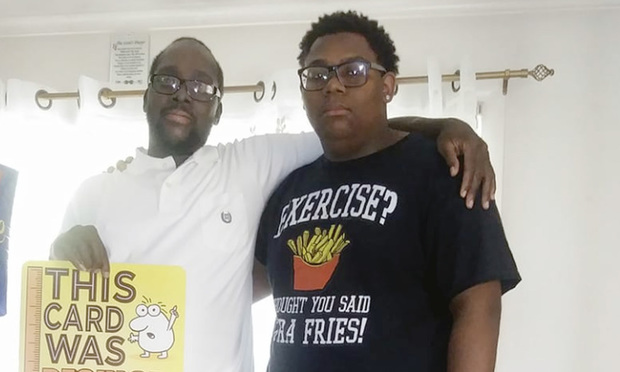State Settles With Former Inmate Apparently Misdiagnosed With Psoriasis When He Had Cancer for $1.3M
Former prisoner Wayne World recently settled his medical neglect lawsuit with the state for $1.3 million. His attorneys called the medical care he received "criminal recklessness." World had skin cancer, while prison doctors said it was psoriasis.
August 23, 2018 at 03:06 PM
5 minute read
 Wayne World, left, with his son soon after his May release from the Osborn Correctional Institute. Courtesy photo
Wayne World, left, with his son soon after his May release from the Osborn Correctional Institute. Courtesy photoA former Connecticut inmate, released from prison early in May because of his deteriorating health condition, has settled his medical neglect lawsuit against the state for $1.3 million.
Wayne World, his attorneys said, was misdiagnosed for nearly three years with psoriasis when he actually had an acute case of skin cancer. That misdiagnosis was neglectful and made World's condition worsen over time, according Ken Krayeske, one of his two attorneys.
“They did not order a biopsy for him, despite him begging for one, until October 2015. He should have had one in 2012 or 2013,” Krayeske told the Connecticut Law Tribune Thursday. “The delay was deliberate indifference and caused him to get worse.” By June 2014, Krayeske said, World's entire body was covered with multiple clusters of dry, red scaling plaques. World, who was serving a 17-year prison term for manslaughter, sued the state in federal court in March 2016. World had most recently been incarcerated at Osborn Correctional Institution in Somers.
World, 39, recently received a second bone marrow transplant and is “going through an aggressive chemotherapy regiment. His condition is volatile,” said DeVaughn Ward, co-counsel for World.
World's long-term prognosis is unclear, Ward said.
“He cannot work right now and he has a low white blood cell count, similar to someone with HIV or AIDS. His immune system is low,” Ward said. “He cannot be in contact with a lot of people, as he is very susceptible to infection and disease.”
World is living with family in Manchester, his attorneys said.
Both Krayeske and Ward are Hartford-based solo practitioners.
The settlement agreement, which was signed on Monday, calls for the state to pay $1.3 million. The money will be paid within 45 days, World's attorneys said. As part of the settlement agreement, the state admits no liability and World is on the hook for $700,000 for his incarceration and more than $1 million for his medical care. But, Krayeske said, the settlement agreement spells out that the state cannot take the money owed from the settlement funds. It is unlikely, “unless Wayne hits the lottery,” that the state will get reimbursed for the incarceration and medical care costs, Krayeske said.
World, his attorneys said, did not think the settlement was fair for what he suffered.
“Our client was faced with a tough decision,” Ward said. “His medical condition is a week-to-week situation. He has a 16-year-old son and he had to weigh his options. He had a $1 million settlement on the table or he could litigate for the next year or two and could have lost at trial and had nothing.”
The two attorneys have filed several similar suits on behalf of other inmates who also allegedly received substandard medical care. In some cases, Krayeske said, the inmates died because they were misdiagnosed or not treated properly and in time.
“The broader point is that $1 million is really a drop in the bucket to the state,” Ward said, “We hope this settlement amount and the media attention it has generated will wake up the [state] Legislature,” Ward said. “We know that Wayne is one of 25 inmates included in a report identified by the Department of Correction of extreme medical deficiencies. Nine of those cases were deaths.”
Ward continued: “The Legislature has not demanded the release of the report.”
Ward said he and Krayeske have been flooded “daily with letters by prisoners and their families complaining of the denial or delay of medical care. What happened to Wayne was criminal recklessness.”
Said Krayeske: “Prisoners are people. They do not check their medical rights at the door.”
According to an email received by the Connecticut Mirror, DOC spokeswoman Karen Martucci said the department is “committed to the consistent, medically appropriate, and humane treatment of all of the offenders under its supervision. As we reshape our healthcare delivery system after transitioning from the University of Connecticut Health to the Department of Correction, we are focused on creating an enhanced model of services with a strong foundation of quality assurance.”
The state denied most of the allegations outlined in the lawsuit. In court papers, the state denied World's claim that there was a “deprivation and violations of his constitutional rights.”
The state was represented by Madeline Melchionne and Steven Strom, both of whom are with the Office of the Connecticut Attorney General. Jacyln Severance, spokeswoman for the Attorney General's Office, said the office would have no comment.
This content has been archived. It is available through our partners, LexisNexis® and Bloomberg Law.
To view this content, please continue to their sites.
Not a Lexis Subscriber?
Subscribe Now
Not a Bloomberg Law Subscriber?
Subscribe Now
NOT FOR REPRINT
© 2025 ALM Global, LLC, All Rights Reserved. Request academic re-use from www.copyright.com. All other uses, submit a request to [email protected]. For more information visit Asset & Logo Licensing.
You Might Like
View All

'Battle of the Experts': Bridgeport Jury Awards Defense Verdict to Stamford Hospital
3 minute read
Settlement Allows Spouses of U.S. Citizens to Reopen Removal Proceedings
4 minute read
Judge Awards Over $350K in Attorney Fees in Data Breach Class Action Settlement
3 minute readTrending Stories
- 1Uber Files RICO Suit Against Plaintiff-Side Firms Alleging Fraudulent Injury Claims
- 2The Law Firm Disrupted: Scrutinizing the Elephant More Than the Mouse
- 3Inherent Diminished Value Damages Unavailable to 3rd-Party Claimants, Court Says
- 4Pa. Defense Firm Sued by Client Over Ex-Eagles Player's $43.5M Med Mal Win
- 5Losses Mount at Morris Manning, but Departing Ex-Chair Stays Bullish About His Old Firm's Future
Who Got The Work
J. Brugh Lower of Gibbons has entered an appearance for industrial equipment supplier Devco Corporation in a pending trademark infringement lawsuit. The suit, accusing the defendant of selling knock-off Graco products, was filed Dec. 18 in New Jersey District Court by Rivkin Radler on behalf of Graco Inc. and Graco Minnesota. The case, assigned to U.S. District Judge Zahid N. Quraishi, is 3:24-cv-11294, Graco Inc. et al v. Devco Corporation.
Who Got The Work
Rebecca Maller-Stein and Kent A. Yalowitz of Arnold & Porter Kaye Scholer have entered their appearances for Hanaco Venture Capital and its executives, Lior Prosor and David Frankel, in a pending securities lawsuit. The action, filed on Dec. 24 in New York Southern District Court by Zell, Aron & Co. on behalf of Goldeneye Advisors, accuses the defendants of negligently and fraudulently managing the plaintiff's $1 million investment. The case, assigned to U.S. District Judge Vernon S. Broderick, is 1:24-cv-09918, Goldeneye Advisors, LLC v. Hanaco Venture Capital, Ltd. et al.
Who Got The Work
Attorneys from A&O Shearman has stepped in as defense counsel for Toronto-Dominion Bank and other defendants in a pending securities class action. The suit, filed Dec. 11 in New York Southern District Court by Bleichmar Fonti & Auld, accuses the defendants of concealing the bank's 'pervasive' deficiencies in regards to its compliance with the Bank Secrecy Act and the quality of its anti-money laundering controls. The case, assigned to U.S. District Judge Arun Subramanian, is 1:24-cv-09445, Gonzalez v. The Toronto-Dominion Bank et al.
Who Got The Work
Crown Castle International, a Pennsylvania company providing shared communications infrastructure, has turned to Luke D. Wolf of Gordon Rees Scully Mansukhani to fend off a pending breach-of-contract lawsuit. The court action, filed Nov. 25 in Michigan Eastern District Court by Hooper Hathaway PC on behalf of The Town Residences LLC, accuses Crown Castle of failing to transfer approximately $30,000 in utility payments from T-Mobile in breach of a roof-top lease and assignment agreement. The case, assigned to U.S. District Judge Susan K. Declercq, is 2:24-cv-13131, The Town Residences LLC v. T-Mobile US, Inc. et al.
Who Got The Work
Wilfred P. Coronato and Daniel M. Schwartz of McCarter & English have stepped in as defense counsel to Electrolux Home Products Inc. in a pending product liability lawsuit. The court action, filed Nov. 26 in New York Eastern District Court by Poulos Lopiccolo PC and Nagel Rice LLP on behalf of David Stern, alleges that the defendant's refrigerators’ drawers and shelving repeatedly break and fall apart within months after purchase. The case, assigned to U.S. District Judge Joan M. Azrack, is 2:24-cv-08204, Stern v. Electrolux Home Products, Inc.
Featured Firms
Law Offices of Gary Martin Hays & Associates, P.C.
(470) 294-1674
Law Offices of Mark E. Salomone
(857) 444-6468
Smith & Hassler
(713) 739-1250










